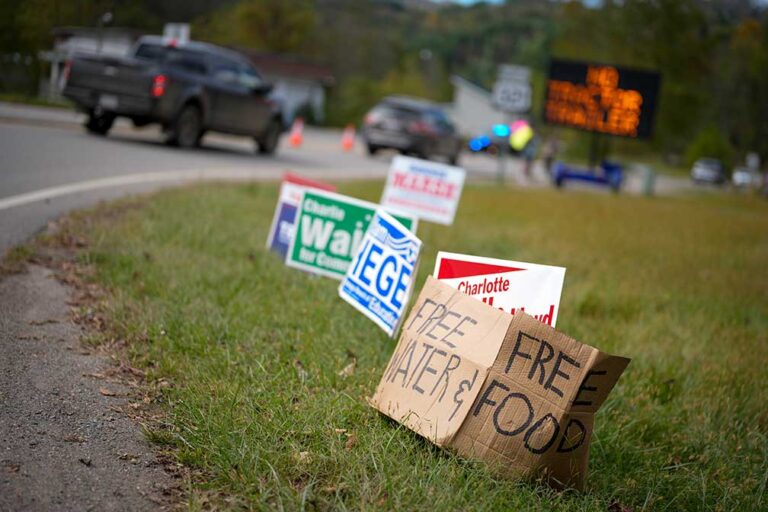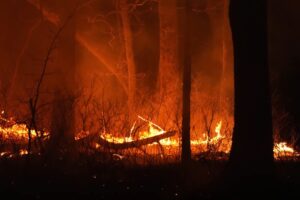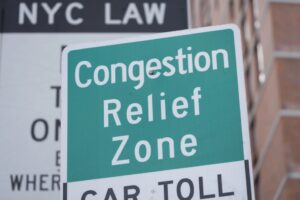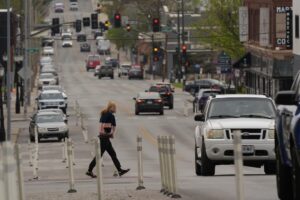VILAS, N.C. — Brad Farrington pulls over to grab a case of water bottles being passed out in Vilas, a small rural community tucked away in the Blue Ridge Mountains. He’s on his way to help a friend who lost much of what he owned when Hurricane Helene blew through last weekend.
His friend, like countless others across western North Carolina, is starting over, which explains why Farrington isn’t thinking too much about politics or the White House race between Republican Donald Trump and Democrat Kamala Harris right now.
“I don’t believe people’s hope is in either people that are being elected,” he said.
Farrington pauses, then gestures toward a dozen volunteers loading water and other necessities into cars and trucks.
“I believe we’re finding a lot more hope within folks like this,” he said.
In the election’s final weeks, people in North Carolina and Georgia, influential swing states, are dealing with more immediate concerns: widespread storm damage. If that weren’t enough, voters in Watauga County, a ticket-splitting Appalachian county that has become more Democratic in recent years, must contend with politicians laying blame while offering support as they campaign in a race that could be decided by any small shift.
Large, uprooted trees litter the sides of roads, sometimes blocking driveways. Some homes in Vilas are inaccessible after bridges collapsed and roads crumbled. More populous areas like Boone, home of Appalachian State University, saw major flooding.
Residents wonder where missing friends and relatives are, is there enough food and water to last until new supplies arrive and how will they rebuild.
The focus is on survival, not politics — and may remain that way for weeks.
Politicians travel to affected battleground states
Trump and Harris have visited North Carolina and Georgia five times since the storm hit. Trump was in North Carolina on Friday, Oct. 4, and Harris was there the next day.
After Trump went to Valdosta, Georgia, on Monday, 20-year-old Fermin Herrera said the former president clinched his vote with his display of caring, not out of any frustration with how President Joe Biden and Harris, the vice president, are handling the federal disaster response. Herrera already leaned toward voting for Trump.
“I feel like everybody’s kind doing what they can,” he said. “All the locals are appreciating the help that’s coming.”
Trump, who has his own mixed record on natural disaster response, attacked Biden and Harris for what he said was a slow response to Helene’s destruction. Trump accused the Democrats of “going out of their way to not help people in Republican areas” and said there wasn’t enough Federal Emergency Management Agency money because it was spent on illegal immigrants. There is no evidence to support either claim.
“I’m not thinking about voters right now,” Trump insisted after a meeting with Georgia’s Republican Gov. Brian Kemp on Friday. “I’m thinking about lives.”
Biden pushed back hard, saying he is “committed to being president for all of America” and has not ordered aid to be distributed based on party lines. The White House cited statements from the Republican governors of Georgia, South Carolina and Tennessee expressing satisfaction with the federal government’s response.
FEMA’s head, Deanne Criswell, told ABC’s “This Week” that this “truly dangerous narrative” of falsehoods is “demoralizing” to first responders and creating “fear in our own employees.”
Criticism of aid efforts so soon after a natural disaster is “inappropriate,” especially when factoring in the daunting logistical problems in western North Carolina, said Gavin Smith, a North Carolina State University professor who specializes in disaster recovery. He said the perilous terrain from compromised roads and bridges and the widespread lack of power and cellphone service make disaster response in the region particularly challenging.
Democratic Gov. Roy Cooper has made several stops in western North Carolina, including Watauga County and surrounding areas, and Biden viewed the extensive damage via an aerial tour.
A focus on recovering and rebuilding
In Watauga County, Jessica Dixon was scraping muck and broken furniture off the ground with a shovel, then dumping it in the bucket of a humming excavator. The 29-year-old stood in a home she bought two years ago. It’s now gutted after a rush of water forced Dixon, her boyfriend and their two dogs to flee to safety.
Without flood insurance, Dixon is not sure what will happen over the next month. She said she filled out a FEMA application but hasn’t checked her email since. She had given the presidential election some thought before Helene, but now she’s preoccupied with cleaning her home.
“It wouldn’t change my views on anything,” said Dixon, who was planning to vote for Harris.
The presidential election isn’t top of mind for 47-year-old Bobby Cordell, either. He’s trying to get help to neighbors in western Watauga County, which has become inaccessible in some parts.
His home near Beech Mountain is one of those places, he said, after a bridge washed away. Cordell rescued his aunt from a mudslide, then traveled to Boone and has been staying in Appalachian State’s Holmes Convocation Center, which now serves as a Red Cross emergency shelter.
He’s trying to send disaster relief back where he lives by contacting officials, including from FEMA. That conversation, he said, “went very well.”
Accepting help isn’t easy for people in the mountains, he said, because they’re used to taking care of themselves.
Now, though, the people who are trapped “need everything they can get.”
Helping neighbors becomes more important in Helene’s aftermath
Over the past week of volunteering at Skateworld, where Farrington stopped for water, it’s become harder for Nancy Crawford to smile. She’s helped serve more than 1,000 people, she said, but the emotional toll has started to settle in for “a lot of us that normally are tough.”
That burden added to the weight she was already feeling about the election, which she said was “scary to begin with.” Crawford, a registered Republican, said she plans to vote for Harris. As a Latina of Mexican descent, she thinks Trump’s immigration policies would have harmful effects on her community.
The storm, she said, likely won’t change her vote but has made one thing evident.
“It doesn’t matter what party you are, we all need help,” she said.
Jan Wellborn had a similar thought as she made her way around the Watauga High School gym collecting supplies to bring to coworkers in need. A 69-year-old bus driver for the school district, she said the outpouring of support she’s seen from the community has been a “godsend.”
She takes solace from the county’s ability to pull together. The election matters, she said, but helping people make their way through a harrowing time matters more.
“The election, it should be important,” Wellborn said. “But right now we need to focus on getting everybody in the county taken care of.”
By Makiya Seminera, The Associated Press. Associated Press writer Russ Bynum in Savannah, Georgia, contributed to this report.
The Associated Press is an independent global news organization dedicated to factual reporting. Founded in 1846, AP today remains the most trusted source of fast, accurate, unbiased news in all formats and the essential provider of the technology and services vital to the news business. The Trucker Media Group is subscriber of The Associated Press has been granted the license to use this content on TheTrucker.com and The Trucker newspaper in accordance with its Content License Agreement with The Associated Press.









While I agree that short term, the elections are not real important to people who have had their homes destroyed. However, long term, if they want to remain free and still have the right to vote, they better understand who the lying communists are and vote against them. Not voting or letting North Carolina go to the communist (democratic) party will destroy their lives for years rather than a few months.